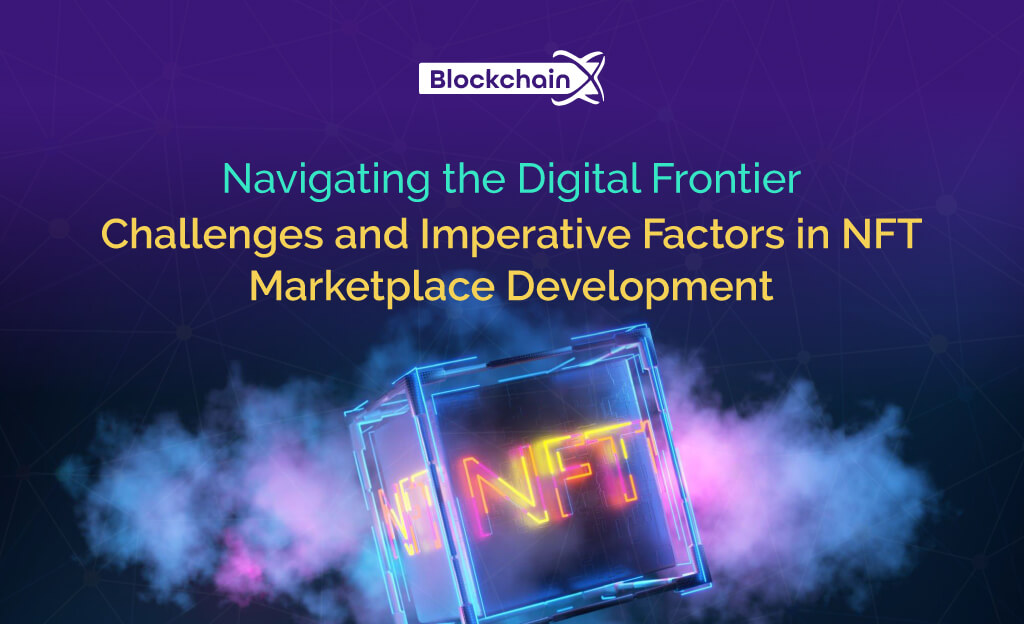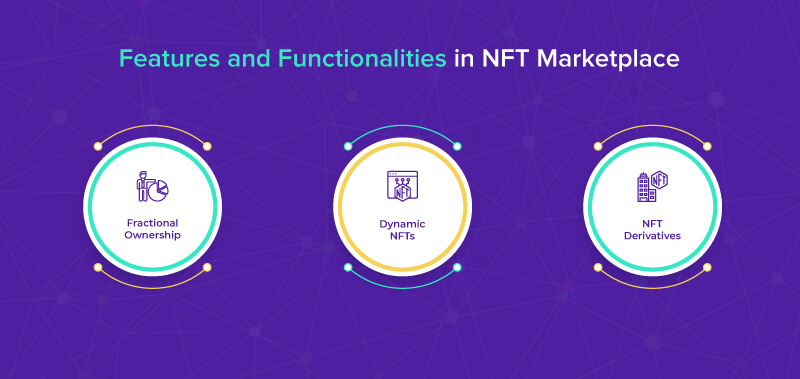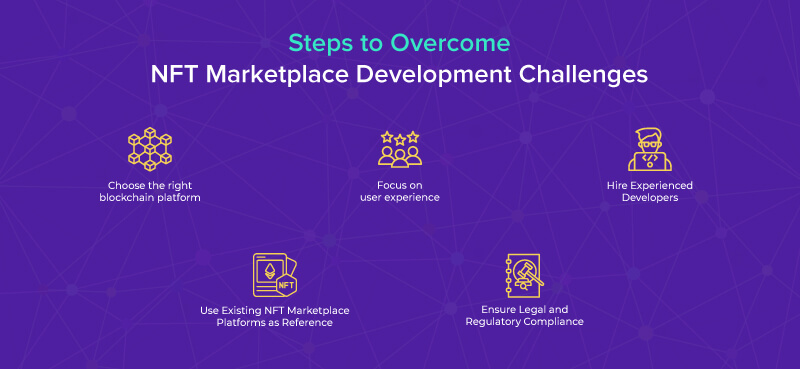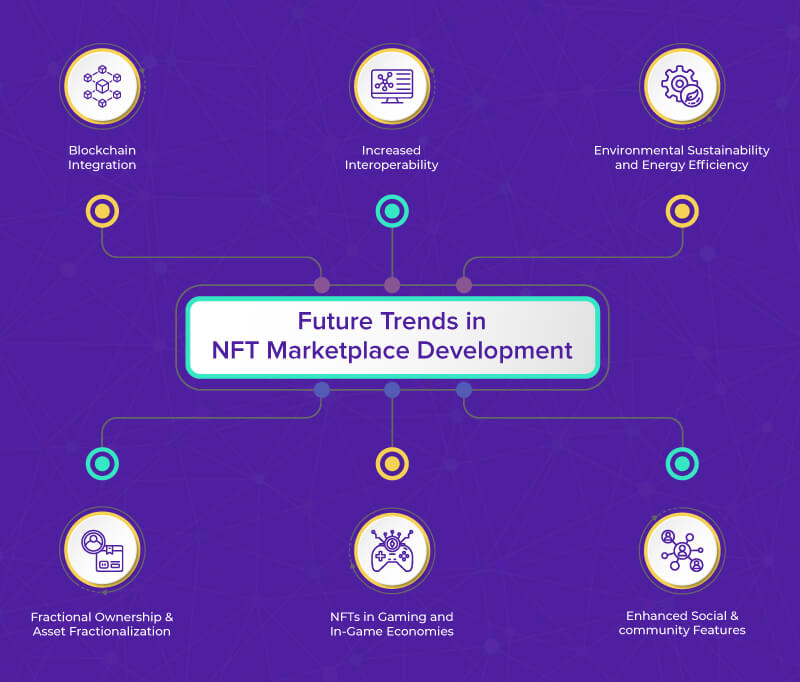
NFT Marketplace Development: A Comprehensive Analysis of Challenges and Imperative Considerations
Do you want to take advantage of the growing NFT marketplace app trend?
With the increasing use of NFTs (non-fungible tokens) across various industries, the demand for app development services to assist businesses in capitalizing on this exciting new trend is expanding. It is now more crucial than ever to get started with NFT marketplace development. You need an app that effortlessly delivers everything you need to create, organize, and sell your digital assets online, with a variety of features and benefits.
And we are here to assist you in exploring the challenges, features, and benefits. This blog post is your comprehensive guide to challenges and the NFT marketplace.
Understanding of NFT Marketplace
The NFT Marketplace is a digital platform that enables businesses to sell, buy, and trade NFTs in an online market. This platform provides a secure, fast, and simple option for businesses looking to capitalize on the benefits of NFTs by harnessing the latest blockchain technologies.
The NFT marketplace is the best solution for businesses looking to get ahead in this rapidly growing sector, with features such as customizability, management capabilities, and seamless interaction with payment gateways.
Features and Functionalities in NFT Marketplace

NFT Marketplace solutions are providing unique features that are reshaping our perception of and interaction with digital assets. These disruptive features not only improve the user experience but also open up new opportunities for creators, collectors, and investors in the ever-changing world of NFTs.
Fractional Ownership: NFT ownership is becoming more accessible due to fractional ownership. High-value assets can be divided into smaller shares, making them more accessible to a wider range of investors. The move coincides with the shared ownership notion, allowing more people to engage in NFT marketplaces.
NFT Derivatives: NFT derivatives, such as futures and options, are emerging as tools for betting on NFT prices. These financial tools broaden the NFT market by enabling users to hedge their NFT investments.
Dynamic NFTs: Some NFTs have dynamic features that change over time or respond to external inputs. These interactive NFTs enhance ownership by encouraging interaction and uniqueness.
Key Considerations of NFT Marketplace Development
When developing an NFT (Non-Fungible Token) marketplace development, there are several key considerations to keep in mind:
1. Blockchain Platform: Select an appropriate blockchain platform for your NFTs. Ethereum standard is the most popular choice, but other platforms like Binance Smart Chain, Flow by Dapper Labs, and Polkadot are also viable options.
2. Smart Contracts: Create secure and efficient smart contracts to handle the creation, transfer, and ownership of NFTs. Ensure the contracts are audited for security vulnerabilities.
3. Token Standards: Adhere to established token standards like ERC-721 or ERC-1155 (Ethereum) for interoperability and compatibility with wallets and other marketplaces.
4. User Experience: Design an intuitive and user-friendly interface for both creators and buyers. Simplify the process of minting NFTs, listing them, and purchasing NFTs to encourage user adoption.
5. Gas Fees and Scalability: Address the issue of high gas fees on blockchain networks like Ethereum. Consider layer 2 solutions or explore blockchain platforms with lower transaction costs.
6. Licensing and Intellectual Property: Implement a robust system for verifying the authenticity and ownership of digital assets. Ensure creators' intellectual property rights are protected and respected.
7. Integration with Wallets and Marketplaces: Ensure seamless integration with popular cryptocurrency wallets and the key considerations of NFT marketplaces are to enhance accessibility and liquidity.
8. Community and Marketing: Build a strong community around your marketplace. Engage with artists, collectors, and enthusiasts. Develop effective marketing strategies to attract users and creators.
9. Legal and Regulatory Compliance: Understand the legal implications of NFT trading in different jurisdictions. Ensure adherence to applicable regulations and tax laws.
10. Security: Prioritize the security of your platform. Implement encryption, two-factor authentication, and other security measures to safeguard user accounts and transactions.
Challenges of NFT Marketplace App Development
Some of the prominent challenges of NFT marketplace development include:
High and Hidden Fees: Developing an NFT marketplace poses a significant challenge with the presence of undisclosed costs, covering developer and maintenance fees along with additional expenses for features not initially specified in the contract.
Poor User Experience: Creating an NFT marketplace app demands an intuitive interface; if the platform is difficult to navigate or poorly designed, attracting and retaining users becomes an uphill task in the long run.
Lack of Creativity and Expression for Creators: For creators and sellers, limited creative control and customization options pose challenges, hindering their ability to truly personalize their digital assets.
Poor Customer Support: Challenges of NFT Marketplace Development arise due to inadequate customer support, ranging from unresponsive development teams to usability problems, delayed bug fixes, and updates.
No Attention to UI and UX: Many face the challenge of neglecting user experience (UX) and user interface (UI) design. This oversight leads to poorly designed, confusing features that are difficult to navigate.
Limited Payment Methods: Another common hurdle involves restricted payment methods, leading to complex checkout processes and a lack of flexibility for customers to use their preferred payment methods or currencies.
Defective Copyright Protection: NFT marketplace development often faces issues with copyright protection. Collaborating with adept developers well-versed in IP protections is crucial to safeguarding digital assets from unauthorized use or theft.
Confusing Industry Regulations: Establishing an NFT marketplace becomes daunting due to perplexing industry regulations. These encompass intricate compliance requirements and legal intricacies that might not align with the needs of businesses or their customers.
Steps to Overcome NFT Marketplace Development Challenges

Developing an NFT marketplace app can be a complex endeavor, but overcoming challenges is possible with careful planning and execution. Here are the steps to overcome NFT marketplace development challenges:
Choose the Right Blockchain Platform: Selecting the ideal blockchain platform is pivotal for NFT marketplace success. Developers must assess scalability, security, and transaction speed. Leading options include Ethereum, Binance Smart Chain, and Polygon, ensuring optimal performance.
Focus on User Experience: Prioritize user experience in NFT marketplace app design. Create an intuitive, visually appealing interface, emphasizing security and privacy. Users' personal data protection is paramount for sustained engagement.
Hire Experienced Developers: Engage skilled app developers proficient in blockchain and smart contract development. Their expertise ensures secure, efficient smart contracts that meet platform standards. Hiring experts guarantees timely, budget-friendly app delivery.
Use Existing NFT Marketplace Platforms as Reference: Leverage existing NFT platforms for insights. Identify best practices, user preferences, and potential challenges. Learning from others' experiences helps avoid common pitfalls and enhance the app's overall quality.
Ensure Legal and Regulatory Compliance: Consult legal experts to ensure adherence to regulations. Stay updated on the latest legal requirements. Implement Anti-Money Laundering (AML) and Know Your Customer (KYC) measures for user safety, building platform trust in NFT Marketplace solution.
Future Trends in NFT Marketplace Development

Blockchain Integration
Increased Interoperability
Environmental Sustainability and Energy Efficiency
Fractional Ownership and Asset Fractionalization
NFTs in Gaming and In-Game Economies
Enhanced Social and Community Features
Conclusion
The world of NFT marketplace development is a fascinating blend of technological innovation, creative expression, and ethical responsibility. By addressing these key considerations and challenges head-on, developers can create vibrant, sustainable, and socially responsible marketplaces that not only empower creators but also redefine the way we perceive and interact with digital art and assets. As the NFT marketplace continues to evolve, embracing these challenges becomes the cornerstone of a thriving and inclusive digital ecosystem.
Explore your NFT journey with BlockchainX ! Whether you want a trusted market or to create your NFT app, we cater to your needs and goals. Reach out today!





